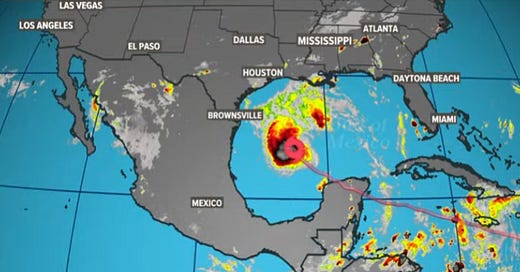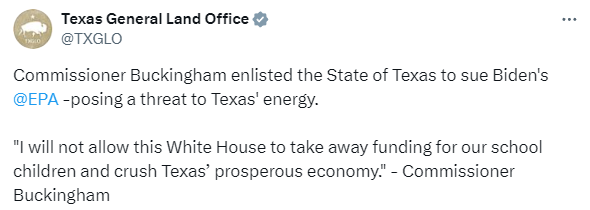Hurricane Beryl, The Texas Coast, And The Growing Threat of Extreme Weather
From Denial to Disaster: The Texas GOP’s role in the climate emergency.
Note: To the Lone Star Left readers on or near the coast. My thoughts are with you this week. Be prepared and stay safe. 💙
Hurricane Beryl is breaking records across the board. Not only did it intensify at unprecedented rates, but it’s also the earliest Category 5 storm on record. This is all fueled by record-warm water temperatures.
(If you’re new here, the hyperlinks below lead to the sources.)
Why is the ocean heating up?
Record ocean temperatures, driving the intensity of storms like Hurricane Beryl, are primarily due to human-induced climate change. The main contributor to rising ocean temperatures is the increase in greenhouse gases, which trap heat in the atmosphere and warm the planet. The oceans absorb this heat, leading to higher sea surface temperatures.
Over the past few decades, the frequency and intensity of marine heat waves have increased dramatically. These heatwaves, driven by global warming, can lead to significant disruptions in marine ecosystems, causing mass migration or death of marine life, coral bleaching, and shifts in fisheries, which all have profound ecological and economic impacts.
If you missed it earlier this week: Shark attacks four beachgoers on South Padre Island on July 4.
In addition to the long-term global warming trend, specific events have recently exacerbated the situation. For example, transitioning from La Niña to El Niño typically results in warmer ocean conditions. This shift, combined with reduced sulfate emissions from new shipping regulations and increased stratospheric water vapor from volcanic eruptions, has pushed ocean temperatures to unprecedented levels.
Warmer ocean waters provide more energy for storms, leading to more frequent and intense hurricanes. As the ocean absorbs heat, we can expect more extreme weather events, including stronger hurricanes and increased rainfall associated with these storms.
Why is Texas distinctly unique in the global fight for climate change?
Texas plays a significant role in contributing to global warming through its pollution and greenhouse gas emissions. As the largest emitter of carbon dioxide in the United States, Texas produced about 663 million metric tons of CO2 in 2021 alone, almost double the emissions of California. If Texas were a country, it would rank as the eighth-largest emitter of CO2 globally.
Texas emits more greenhouse gases than the following countries:
United Kingdom
France
Italy
Canada
Austalia
Spain
Mexico
South Korea
Indonesia
Saudi Arabia
Texas’s primary emissions sources are the fossil fuel industry, transportation, and electricity generation. Texas is the leading state in crude oil and natural gas production and refining, accounting for a substantial portion of industrial emissions. The state’s transportation sector also contributes significantly, with Texans driving more miles per capita than most other states, leading to high emissions from passenger vehicles, trucks, and commercial aircraft.
The economic impact of extreme weather in Texas.
Texas’s agriculture sector is highly vulnerable to extreme weather. Hurricanes can cause severe flooding, damaging crops and farmland. For instance, Hurricane Harvey in 2017 resulted in an estimated $200 million in agricultural losses due to damaged crops and livestock infrastructure. Droughts, on the other hand, lead to water shortages, affecting crop yields and livestock health. The drought of 2011, one of the worst in Texas history, cost the state approximately $7.62 billion in agricultural losses.
Infrastructure damage from extreme weather events is another significant economic burden. Hurricanes can cause widespread destruction to roads, bridges, and buildings, necessitating extensive and costly repairs. Hurricane Harvey alone caused over $125 billion in damages, making it one of the most expensive natural disasters in U.S. history. The state’s power grid is also vulnerable; the February 2021 winter storm led to widespread power outages and significant economic disruption, costing the state an estimated $195 billion.
The costs associated with disaster response and rebuilding efforts are enormous. After a major hurricane or drought, resources must be allocated for emergency response, including search and rescue operations, medical aid, and temporary shelters. Rebuilding efforts can take years and require substantial financial investments. Federal and state agencies often bear much of this cost, but local businesses and residents also face significant expenses. For example, the rebuilding costs from Hurricane Harvey included over $9 billion in federal disaster relief funds and billions more in insurance claims and private spending.
Why is Texas in this position?
A new report named Texas the most vulnerable state to climate change.
There is one reason why we are in this position, and that is climate-denying Republicans.
You’re thinking, “It’s 2024; how could anyone in their right mind still deny that there is a climate emergency despite the mountains of scientific evidence?”
It’s because Texas Republicans prioritize oil and gas industry money over science, over our state, and over our lives.
The Texas Land Commissioner heads the Texas General Land Office (GLO), which manages state-owned lands and resources. The Commissioner oversees managing, leasing, and selling state lands, administering mineral rights, and extracting natural resources such as oil and gas. She also manages the Texas Permanent School Fund, a public endowment established to benefit public education in Texas. Revenues from state lands, particularly from oil and gas leases, contribute to this fund.
Here is the Texas Land Commissioner Dawn Buckingham:
Land Commissioner Buckingham sued the Biden Administration to stop clean energy initiatives.
Despite its name, the Texas Railroad Commission (RRC) primarily regulates the oil and gas industry, pipelines, natural gas utilities, the LPG/LNG industries, and coal and uranium surface mining operations in Texas.
Here is one of our Texas Railroad Commissioner, Wayne Christian, denying climate change and pushing for more fossil fuels.
In December 2022, the Senate Committee on State Affairs had a hearing in East Texas over the closing of a coal power plant.
Here, Republican Senator Brian Birdwell is denying climate change and talking about a QAnon conspiracy related to eating bugs:
During the 88th Legislative Session, Republicans made Texas an oil and gas “sanctuary state.”
Yes, it’s absurd. Even in the face of extreme weather, and even though Texas emits more greenhouse gases than a large portion of the world, they are still trying to coddle fossil fuels.
HB33 prohibits state agencies and their employees from contracting with or assisting federal agencies or officials in enforcing federal statutes, orders, rules, or regulations related to oil and gas operations if those federal regulations impose prohibitions, restrictions, or other regulations that do not exist under Texas state law.
Making Texas an oil and gas “sanctuary state” was only one of the egregious and adverse climate change bills the Texas Legislature passed last session.
SB1017 limits the regulatory authority of local governments in Texas regarding energy sources and engines. It establishes that local political subdivisions, including counties, municipalities, and other entities, cannot adopt or enforce ordinances or regulations that limit access to or use of energy sources or effectively prohibit the necessary infrastructure for these energy sources.
Even more unfortunate, some Democrats crossed the aisle to co-author, co-sponsor, and vote for this bill. Some might say it’s because these Democrats are in districts that have high fossil fuel employment. However, a more productive bill would have provided oil and gas workers with job transition programs.
In the last Legislative Session, Democrats introduced several bills to mitigate the impacts of climate change and hold the fossil fuel industry accountable.
It isn’t for lack of effort. Unfortunately, as long as climate-denying Republicans are at the helm, we’re at their mercy. Some of those bills included:
HB228, by Vikki Goodwin (D), would have taxed flared or vented gas. This bill would discourage the wasteful and environmentally harmful practice of gas flaring, thereby reducing greenhouse gas emissions. However, Morgan Meyers (R), Chairman of the Ways and Means Committee, killed this bill.
The Senate companion to this bill was SB256, by Sarah Eckhardt (D). It was killed by Finance Committee Chairman Joan Huffman (R).
HB1276, by Gina Hinojosa (D), would have reduced methane flaring, a significant source of greenhouse gas emissions. However, Craig Goldman (R), the Energy Resources Committee Chairman, killed this bill.
A similar bill in the Senate, SB257, by Sarah Eckhardt (D), was killed by Natural Resources Committee Chairman Brian Birdwell (R).
HB1459, by Jon Rosenthal (D), would have eliminated routine flaring, directly addressing one of the significant sources of methane emissions in the oil and gas industry. Craig Goldman (R) also killed this bill.
The Senate companion to this bill was SB2130, by Borris Miles (D). Brian Birdwell (R) also killed it.
HB1782, by Gina Hinojosa (D), would have required gas capture plans and a drilling permit to help ensure less gas is vented or flared, reducing greenhouse gas emissions. Craig Goldman (R) killed it.
HB4577, by Penny Morales Shaw (D), would have supported research into the environmental impacts of harmful chemicals used in fracking. This could have led to regulations that could reduce pollution and improve environmental health. Brooks Landgraf (R), the chairman of the Environmental Regulation Committee, killed this bill.
In Texas, Republicans are the problem, and the only solution is to vote them out.
The current political climate in Texas, dominated by climate-denying Republicans, is a significant barrier to progress in addressing climate change and embracing clean energy solutions. The Republican leadership in Texas has consistently prioritized the interests of the fossil fuel industry over environmental protection and public health. This stance is detrimental to Texas and has broader implications for the global climate.
The oil and gas industry’s influence on Texas politics cannot be overstated. Texas Republicans receive substantial campaign contributions from fossil fuel companies, which significantly impacts their legislative priorities. This financial backing leads to policies that favor the fossil fuel industry, often at the expense of environmental protection and public health.
The refusal to address climate change proactively has dire consequences for Texas. Climate change exacerbates the state’s vulnerability to extreme weather events like hurricanes and droughts. These events cause extensive damage to infrastructure, agriculture, and the economy, costing billions in disaster response and rebuilding efforts. Moreover, the health impacts of pollution from the fossil fuel industry disproportionately affect low-income and minority communities, further showing the need for a shift in policy.
It is imperative to vote Republicans out of the Legislature to see a Texas that embraces clean energy and actively works to mitigate climate change.
The current Republican leadership in Texas is a significant obstacle to climate progress. Their policies favor the fossil fuel industry at the expense of environmental and public health. To achieve a greener, more sustainable Texas, voting for leaders committed to addressing climate change and promoting clean energy is essential. Only then can Texas genuinely lead in the fight against climate change and set an example for the rest of the nation.
Vote early, vote often, just vote.
122 days left until the November 5 election!
LoneStarLeft’s Newsletter is a reader-supported publication. To receive new posts and support my work, consider becoming a free or paid subscriber.
Follow me on Facebook, Twitter, TikTok, Threads, YouTube, and Instagram.










Cancun Cruz can't miss a natural disaster to fail to offer help
Republican Sen. Ted Cruz caught flak Monday as critics noted he recorded five podcasts in the last week as millions lost power in Texas due to flooding from Hurricane Beryl.
don't know about Houston but there isn't much news about beryel here..........................so my dear slothful and indolent D candidates....here is what CC has done to my homeowner's insurance...it went up 15% for '24-'25 and air quality in DFW is red flagged nearly every day , spring thru fall.
homeowners know about insurance rates and mom's know about air quality....meanwhile Colin talks about his mom alot and all the other D's don't say anything.....The Republican party of Tarrant County sends out an newsletter once a week.....I KNOW EXACTLY WHAT THEY ARE THINKING....its not CC.
My D's? i am not even sure if they are running.